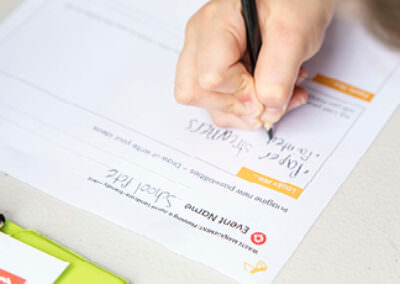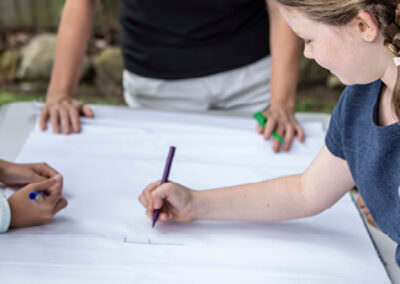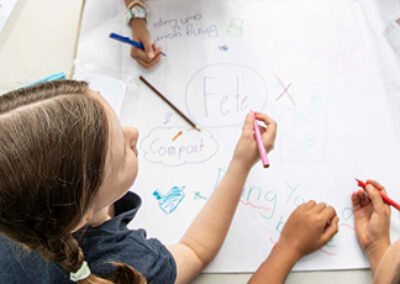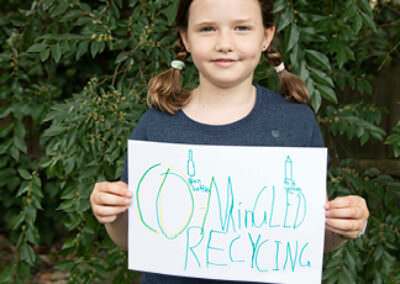
Planning a Junior Landcare friendly event
Time Allocation: 40 - 50 minutes*
Activity Level: Moderate, Complex
Introduction
With Australia’s growing population, we need to find solutions to manage our waste produced from food production, gardening, leisure activities, technology and general goods. We need to divert waste from landfill that can be reused, recycled or composted so that valuable resources can be recovered. Landfill is the name we give to the rubbish or waste that is buried, sometimes known as a tip or rubbish dump.
The resources we use create waste so what do we do with this waste matter? We are responsible for the waste we produce and where it ends up.
The adult’s key role is to facilitate discussions during this activity or project, and assist the young people with access to documentation and other adults who may be able to assist with the planning of the event.
*For introduction and initial brainstorm activity.
Checklist
Instructions
 STEP 1
STEP 1
Provocation
So we have a special event [insert the name of your event] coming up in our community. I was wondering if it is possible for us to have celebrations and special events in our community while also showing care for the environment. Can we have both? Discuss.
Imagine new possibilities
Encourage the children to imagine new possibilities. What might an event that shows care and respect for the environment: Look like? Sound like? Feel like?
Complete the activity sheet to guide their planning.
 STEP 2
STEP 2
Connecting ideas
Planning is the most important step in organising a Junior Landcare-friendly event.
Discuss what values or beliefs will guide the children in planning for their event; for example care, respect, responsibility.
Considerations:
- what event are you holding?
- is it a swimming carnival, school dance, mini-fete, market stall, sports carnival, end of year class party or a cultural celebration?
- who is responsible for the overall planning of this event?
- will you have an organising committee? Some people you might want to involve include teachers, students, parents and other children
- how can you positively influence this group? How can you offer support and solutions?
- what waste do you anticipate at this event? Some items to consider are food scraps, glass, paper, firm plastic, aluminum, soft plastics and landfill.
- what are the expectations for a Junior Landcare-friendly event?
- how might this be different to previous events held in your community?
 STEP 3
STEP 3
Seek solutions by brainstorming in groups, and record your ideas in your activity sheet, the poster sized sheet or digital device. Where possible, goods used at your event should be reusable, compostable or recyclable.
Organise – bin stations for your waste streams. Decide the best position for the bin stations.
You may need to organise extra waste collection services for a large event.
Refuse – can some items previously used be removed from your event? e.g. balloons, bottled water, straws, laminated signs.
Reuse – can non-sustainable items be substituted for reusable alternatives? e.g. bunting for balloons, water refill stations instead of bottled water, reusable cups, ceramic plates for plastic single-use plates.
Reduce – what actions can you take or how can you influence to minimise waste at this event? e.g. careful ordering, minimise non-reusable and non-recyclable packaging and catering products.
Rot – will there be food waste? Can this be composted onsite or offsite? e.g. someone from your community, the local council or a ShareWaste member may be able to take your food waste.
 STEP 4
STEP 4
Putting ideas into action on the day
Managing waste onsite will be the biggest job for your group on the day. Have a clearly labelled four-bin recycling station if possible.
Here are a few useful tips to organise your bin stations:
- label the bins comingled recycling (paper cardboard, aluminum, steel, glass) composting, soft plastics, landfill (this may depend where you live in Australia and what your council collects)
- ensure the bin stations are set up in the same order at each location to avoid confusion
- roster friendly helpers at each bin station to prevent contamination of waste streams. This will make it easy for people to dispose of their waste responsibly. Give them a high 5 if they ‘bin it right!’
Use this event as an opportunity to teach others about what you have done and what you have learnt. e.g. fun signage, social media posts and announcements.
Extension Activity
Investigate how local Aboriginal or Torres Strait Islander communities maintain a special connection to, and responsibility for Country/Place.
What would your weekly garbage selfie look like? Take a photo of yourself surrounded by your rubbish for 1 week. What can you learn from this?
What sustainable actions can you adopt at home to minimise rubbish going to landfill?